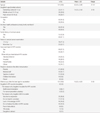Abstract
Purpose
This study was aimed to examine mothers'knowledge about human papillomavirus (HPV)vaccination to prevent cervical cancer in Korea.
Methods
From September 20 to October 10 2011, 101 mothers who have adolescent girls were surveyed with questionnaires about their general characteristics, the knowledge of HPV vaccine, inoculation rate and vaccination-related factors of their daughters.
Results
The percentage of correct answers for HPV vaccine knowledge was 24.2% and the HPV vaccination rate was only 5.9%. HPV vaccine knowledge score of the vaccination group was significantly higher than that of the non-vaccinated group. Mothers said that the reasons why they didn't vaccinate their daughters against the HPV was the financial burden, the lack of HPV knowledge, and worries about possible side effects. The participants addressed that they understood the appropriate age for vaccination was sixteen.
Figures and Tables
References
1. Devi G, Glodowski M, Shin E. AMWA position Statement; Cervical cancer prevention. J Womens Health (Larchmt). 2009. 18:153.

2. National Cancer Information Center. 2008 cancer statistics. accessed on 29 Dec 2010. Available at http://www.cancer.go.kr/ncic/cics.
3. Bertram CC. Evidence for practice: Oral contraception and risk of cervical cancer. J Am Acad Nurse Pract. 2004. 16:455–461.

4. Dunne EF, Unger ER, Sternberg M, McQuillan G, Swan DC, Patel SS, et al. Prevalence of HPV infection among females in the United States. JAMA. 2007. 297:813–819.

5. Joo WD, Kim SH, Kim DY, Suh DS, Kim JH, Kim YM, et al. Prevalence of Human papillomavirus infection in Korean women: Risk of abnormal Pap smear and cervical neoplasia. Korean J Gynecol Oncol Colposc. 2004. 15:309–316.

6. Kim HW, Ahn HY. Study on the knowledge of human papilloma virus in female university students. Korean J Women Health Nurs. 2007. 13:13–20.

7. Wellings K, Nanchahal K, Macdowall W, McManus S, Erens B, Mercer CH, et al. Sexual behaviour in Britain: early heterosexual experience. Lancet. 2001. 358:1843–1850.

8. Ministry of Health & Welfare. accessed on 9 Nov 2010. Available at http://stat.mw.go.kr/stat/data/cm_data_view.
9. Waller J, Marlow LAV, Wardle J. Mother's attitudes towards preventing cervical cancer through human papillomavirus vaccination: A qualitative study. Cancer Epidemiol Biomarkers Prev. 2006. 15:1257–1261.

10. Kim CJ, Kim BG, Kim SC, Kim YT, Kim YM, Park SY, et al. Sexual behavior of Korean young women: preliminary study for the introducing of HPV prophylactic vaccine. Korean J Gynecol Oncol. 2007. 18:209–218.

11. Lee EJ, Park JS. Knowledge about Cervical Cancer, Health Beliefs and Human Papillomavirus Vaccination Rate in Female University Students. J Korean Oncol Nurs. 2011. 11:65–73.

12. Kim HW. Factors Influencing Mothers' Acceptance of Human Papillomavirus Vaccination to Prevent Cervical Cancer in their Daughters. Korean J Women Health Nurs. 2011. 17:137–147.

13. Walsh CD, Gera A, Shah M, Sharma A, Powell JE, Wilson S. Public knowledge and attitudes towards Human Papilloma Virus (HPV) vaccination. BMC public Health. 2008. 8:368–376.

14. Madhivanan P, Krupp K, Yashodha MN, Marlow L, Klausner JD, Reingold AL. Attitudes toward HPV vaccination among parents of adolescent girls in Mysore, India. Vaccine. 2009. 27:5203–5208.

15. Dahlstrom LA, Tran TN, Lundholm C, Young C, Sundstrom K, Sparen P. Attitudes to HPV vaccination among parents of children aged 12-15 years-A population-based survey in Sweden. 2009. Int J Cancer. 2010. 126:500–507.
16. Kim JH, Park MY. Study on the Knowledge of Cervical Cancer and Human Papillomavirus and Preventive Behavior Intention of Female University Students. J Korean Acad Soc Nurs Educ. 2009. 15:225–231.

18. Lee MH, Lim EJ, Yu YH, Jun MH. Clinical Nurses' HPV-related Knowledge and Perception of Cancer Causes: HPV Vaccinated vs. Not Vaccinated. Korean J Women Health Nurs. 2011. 17:1–9.

19. Han YJ, Lee SR, Kang EJ, Kim MK, Kim NH, Kim HJ, et al. Knowledge regarding cervical cancer, human papillomavirus and future acceptance of vaccination among girls in their late teens in Korea. Korean J Obstet Gynecol. 2007. 50:1090–1099.
20. CDC. National state and Local Area Vaccination Coverage Among Adolescents Aged 13-17 Years-United states, 2008. MMWR Morb Mortal Wkly Rep. 2009. 58:997–1001.
21. Gardner P, Schaffner W. Immunization of adult. N Engl J Med. 1993. 328:1252–1258.
22. Choi KA, Kim JH, Lee KS, Oh JK, Liu SN, Shin HR. Knowledge of human papillomavirus infection and acceptability of vaccination among adult women in Korea. Korean J Obstet Gynecol. 2008. 51:617–623.




 PDF
PDF ePub
ePub Citation
Citation Print
Print





 XML Download
XML Download